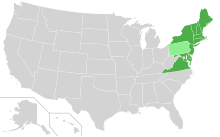 Participants Ruled Unconstitutional | |
| Abbreviation | RGGI or ReGGIe |
|---|---|
| Established | 2009 |
| Type | Intergovernmental organization |
| Purpose | Combating global warming |
| Headquarters | New York, NY |
Membership | Participants: Connecticut, Delaware, Maine, Maryland, Massachusetts, New Hampshire, New Jersey, New York, Rhode Island, Vermont, Virginia |
| Website | www |
The Regional Greenhouse Gas Initiative (RGGI, pronounced "Reggie") is the first mandatory market-based program to reduce greenhouse gas emissions by the United States. RGGI is a cooperative effort among the states of Connecticut, Delaware, Maine, Maryland, Massachusetts, New Hampshire, New Jersey, New York, Rhode Island, Vermont, and Virginia to cap and reduce carbon dioxide (CO2) emissions from the power sector.[1] RGGI compliance obligations apply to fossil-fueled power plants 25 megawatts (MW) and larger within the 11-state region.[2] Pennsylvania's participation in the RGGI cooperative was ruled unconstitutional on November 1, 2023,[3] although that decision has been appealed.[4] North Carolina's entrance into RGGI has been blocked by the enactment of the state's fiscal year 2023–25 budget.[5]
RGGI establishes a regional cap on the amount of CO2 pollution that power plants can emit by issuing a limited number of tradable CO2 allowances. Each allowance represents an authorization for a regulated power plant to emit one short ton of CO2. Individual CO2 budget trading programs in each RGGI state together create a regional market for CO2 allowances.[6]
The RGGI states distribute over 90 percent of allowances through quarterly auctions.[7] These allowance auctions generate proceeds, which participating states are able to invest in strategic energy and consumer benefit programs. Programs funded through RGGI have included energy efficiency, clean and renewable energy, greenhouse gas abatement, and direct bill assistance.
An initial milestone program's development occurred in 2005, when seven states signed a memorandum of understanding announcing an agreement to implement RGGI.[8] The RGGI states then established individual CO2 budget trading programs, based on the RGGI Model Rule.[9] The first pre-compliance RGGI auction took place in September 2008, and the program became effective on January 1, 2009. The RGGI program is currently in its fifth three-year compliance period, which began January 1, 2021.[10]
- ^ "Welcome". www.rggi.org. RGGI, Inc.
- ^ "RGGI Fact Sheet" (PDF). RGGI, Inc.
- ^ Huangpu, Kate (2023-11-01). "PA Commonwealth Court strikes down RGGI". Spotlight PA. Retrieved 2023-11-22.
- ^ Huangpu, Kate (2023-11-21). "Gov. Josh Shapiro appeals decisions that struck down key climate program to Pa.'s highest court".
- ^ "North Carolina budget blocks RGGI entry | Argus Media". www.argusmedia.com. 2023-09-25. Retrieved 2023-11-22.
- ^ "Program Design". RGGI, Inc.
- ^ "RGGI Auctions Fact Sheet" (PDF). RGGI, Inc.
- ^ "Program Design". RGGI, Inc.
- ^ "Model Rule and MOU Versions | RGGI, Inc". www.rggi.org. Retrieved 2022-01-06.
- ^ "Compliance". RGGI, Inc.
© MMXXIII Rich X Search. We shall prevail. All rights reserved. Rich X Search
